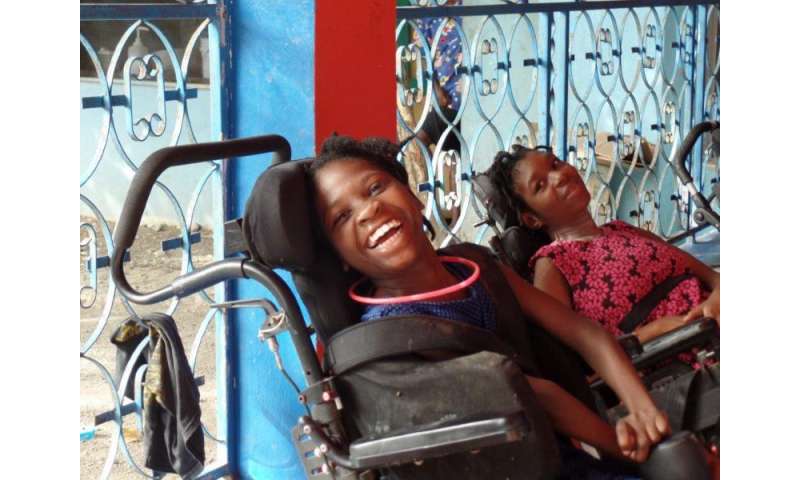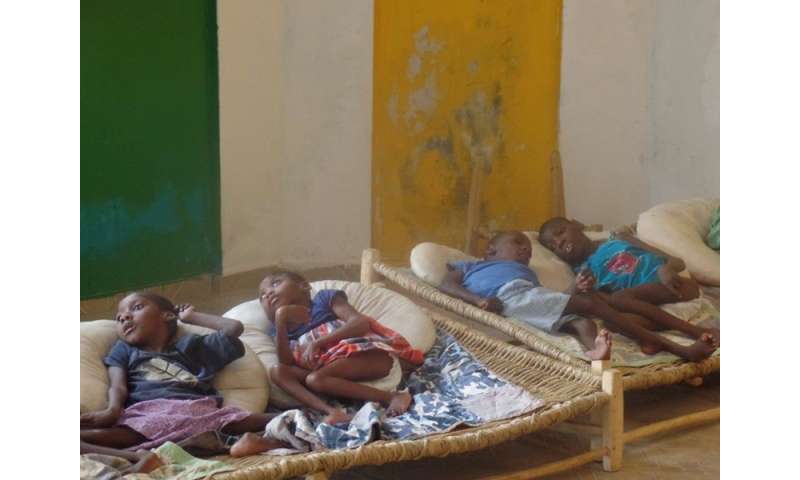Occupational therapy students will travel with professor to Haiti

A group of occupational therapy students will travel to Haiti over spring break to assist orphans with disabilities in a country where disabilities are seen as "a curse" for which the children and their families are often shunned.
"For one thing in Haiti, there's a lot of—what we call—occupational justice that needs to happen, meaning if you have a child with a disability, you've been cursed," Meg Ladyman, assistant professor of applied medicine and rehabilitation, said. "And so often the families do not bond with those children, they don't know what to do with them. It is a reminder that they are cursed. They are sometimes ostracized from the community, so often they will give those children up to orphanages."
A student, Johannah Caress, convinced Ladyman to go to Haiti by introducing her to one of her personal face book stars—an occupational therapist named Autumn Marshall who has spent over eight years in Haiti serving children with special needs. Ladyman and the students quickly watched all of Marshall's videos, and when they discovered Marshall was in the United States, Ladyman convinced Marshall to go to the national OT conference in Nashville, and Marshall talked Ladyman into going to NYC for Adaptive designs. Ladyman convinced Marshall to visit Indiana State University and finally, Marshall invited Ladyman to travel to Haiti.
"And that trumps all," Ladyman said.
Marshall, Ladyman, speech language pathologist Kristin Sayler, and Bill Farrar, founder Fountains of Hope in Carmel, Indiana, endured an eight-hour drive down gravel roads from Port-Au-Prince to Saint-Louis-du-Nord. At the end of their trip, they were greeted with unspeakable Haitian luxury: a cot with a mattress, two hours of electricity daily, and cold water for showers.
Electricity and plumbing are scarce in Haiti, and most families live in shacks.
"There's no trash pickup. If you get in an accident, there are no tow trucks, no police," Ladyman said.
Large U.N. tanks and guards armed with sawed-off shotguns kept the peace.

Ladyman continued, "No ambulances, no hospitals, no doctors, so—you feel very vulnerable when you're there, and it is a little bit scary as an American. However, they are very happy people. When you think of Haiti, you might ask, do you give them a fish or teach them how to fish? In Haiti, you do both."
From there, the group would travel to Marshall's Miriam Center Clinic, which Marshall created after visiting Haiti for the first time and witnessing the lack of resources the staff had to care for the orphans. Marshall and her staff had already made a therapy gym with PVC parallel bars by hand. Time was spent at the clinic assembling positioning equipment donated by the Indianapolis Easter Seals and working with the orphans inside the clinic. Outside the clinic, parents from surrounding villages carried their children down the mountainside to seek Marshall's help.
In addition to working with the children, Marshall has written and distributed pamphlets in Creole explaining Hydrocephaly, Downs Syndrome, Cerebral Palsy, and other disabilities, to destigmatize the conditions and teach parents that they can still bond and connect with their children. Marshall also arranges fun, monthly outings for families to encourage the bond. Ladyman believes this has been working.
"[Marshall] is nothing short of the Mother Teresa of Haiti," Ladyman said. This belief grew stronger as she watched families in need approach her at every chance, and heard the Haitian voices call Marshall's name as they walked through the street—Autiiiim, Autiiim!
Ladyman also visited Dora's Orphanage in Port-Au-Prince and ventured into Cité Soleil, the third largest slum in the world. While there, Ladyman noted the children's hair turning orange—a sign of malnourishment. Ladyman traveled alone to Dora's where she met a worker named Ben while completing range of motion (ROM) on contracted limbs under the mango trees. Through Ben, who spoke English, the staff barraged Ladyman with questions: "What would you do with kids like this in America?" Ben said, "I plead with you, come back here and bring supplies and training and educate us."
Danielle Hobbs, a second-year graduate student from Bloomington obtaining her Master's in occupational therapy, is the student leader for Haiti trip, which will take place over spring break 2016. Since the first meeting in late August, six occupational therapy students have committed to the trip, as well as Ladyman, a pediatric physical therapist from Connecticut Children's Medical named Rosie Flammang, and possibly Autumn Marshall.
Hobbs expressed excitement about the trip and looks forward to working with a vastly different culture. She says the group wants to dispel misconceptions about the disabled. "I believe that we all will gain a new appreciation for our everyday lifestyles, and will help us to become better, more understanding therapists after we graduate."
An original base payment of $1000 is due in December to secure their flight ticket with Fountains of Hope, for which they are trying to raise money through fundraising websites such as Plumfund and Fundly.
The group is also accepting donations of toys for the children and materials for their trip, such as sorting bins, switches, PVC piping, iPads, and trifold cardboard. "We are still accepting contributions in any form and are very grateful for those supporting us," Hobbs said. They will accept donations until they leave the United States on Sunday, March 13. They will return the following Saturday.
"We've got a lot to do when we go back, some of these kids can't fit in their wheelchairs at all, as they are way too big, the wrong fit—but we use what we have, what's donated," Ladyman said.
Individuals who wish to donate money, toys, or materials are encouraged to reach out to Danielle Hobbs, dhobbs7@sycamores.indstate.edu. A number of the students—Danielle Hobbs, Amanda Criste, Chelsea Dause, and Audrey Ortiz—have created crowdfunding websites to cover their costs.
"What I would like to move people to do would be to examine and ask themselves the question, how can you use your skills in a developing country?" Ladyman said. "I never thought, as an occupational therapist, about using my skills in a developing country. That would never have crossed my mind until a student insisted."
Provided by Indiana State University